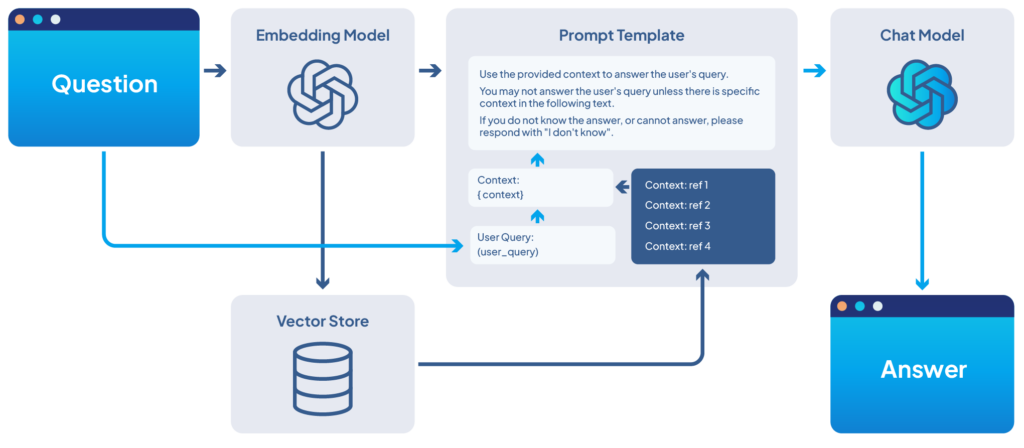InsightGPT is an AI based software based on the Retrieval Augmented Generation framework.

The RAG framework is an innovative approach in natural language processing (NLP) that combines the strengths of retrieval-based and generation-based models. In RAG, the system first retrieves relevant information from a large database (vector store) using a retrieval mechanism.
This retrieved information is then used to augment the generation process, where the model generates responses or outputs based on both the retrieved information and the input query or context.
This framework enhances the contextual understanding of the model by leveraging existing knowledge from the retrieved data, leading to more accurate and coherent responses. RAG is particularly effective in tasks where access to relevant context is crucial for generating high-quality outputs.
The quality of the entire process, which encompasses both the retrieval and generation phases, is monitored through the measurement of a set of key performance indicators.
Privacy Settings
This website uses cookies to improve your experience while you navigate through the website.
View the Cookie Policy View the Personal Data Policy
Google Tag Manager is a tag management service provided by Google Ireland Limited. The data sent is collected for the purposes of personalizing the experience and statistical tracking. You can find more information on the "More information on Google's handling of personal information" page.
Place of processing: Ireland - Privacy Policy
Additional consents:
Open Street Map is a maps visualization service provided by The OpenStreetMap Foundation. This service is used to incorporate content of this kind on its pages.
Place of processing: United Kingdom - Privacy Policy
Google Ads conversion tracking is an analytics service provided by Google Inc. that is used to connect data from the Google Ads advertising network with actions performed on this Site.
Place of processing: Ireland - Privacy Policy
Google Translate is a multilingual machine translation service provided by Google LLC.
Place of processing: United States - Privacy Policy
Google reCAPTCHA is a SPAM protection service provided by Google Ireland Limited.
The use of reCAPTCHA is subject to the Google privacy policy and terms of use.
Place of processing: Ireland - Privacy Policy
Google Analytics is a web analytics service provided by Google Ireland Limited ("Google"). Google uses the collected personal data to track and examine the usage of this website, compile reports on its activities, and share them with other Google services. Google may use your personal data to contextualize and personalize the ads of its advertising network. This integration of Google Analytics anonymizes your IP address. The data sent is collected for the purposes of personalizing the experience and statistical tracking. You can find more information on the "More information on Google's handling of personal information" page.
Place of processing: Ireland - Privacy Policy
Google Ad Manager Audience Extension is a remarketing and behavioural targeting service provided by Google LLC that tracks the visitors of this Website and allows selected advertising partners to display targeted ads across the web to them.
Place of processing: United States - Privacy Policy
Google Maps is a maps visualization service provided by Google Ireland Limited. This service is used to incorporate content of this kind on its pages.
Place of processing: Ireland - Privacy Policy
Google Fonts is a service used to display font styles operated by Google Ireland Limited and serves to integrate such content into its pages.
Place of processing: Ireland - Privacy Policy